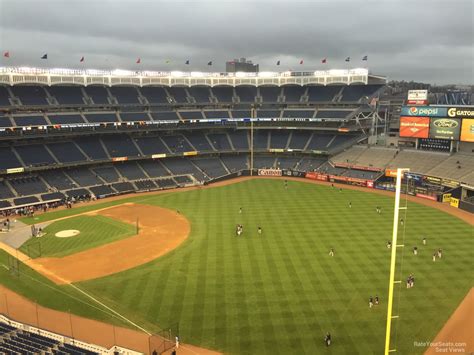Sherly
You need 3 min read
Post on Feb 02, 2025
Table of Contents

Section 409 Yankee Stadium: A Fan's Guide to the Best Seats in the House?
Yankee Stadium, a hallowed ground for baseball enthusiasts, offers a variety of seating options. Among them, Section 409 frequently sparks discussion among fans. Is it truly worth the hype? Let's delve into what makes Section 409 so popular (or not), examining its location, views, amenities, and overall fan experience.
Location, Location, Location: Where is Section 409?
Section 409 is located in the lower level of Yankee Stadium, down the third base line. This prime placement offers several advantages, which we will explore in detail below. Its proximity to the field ensures an unparalleled view of the action, making it a coveted spot for many fans.
Proximity to the Action: A Front-Row Perspective (Almost!)
One of the key selling points of Section 409 is its relatively close proximity to the field. While not directly on the field, it's close enough to feel the energy of the game and get a fantastic view of the players, especially those playing third base and heading towards home plate. You'll be able to see the nuances of the game, the subtle movements of the players, and even the expressions on their faces. This close-up perspective is a major draw for serious baseball fans.
The View from Section 409: Uninterrupted Action
The view from Section 409 is generally considered excellent. The angle is such that it offers an unobstructed view of the entire playing field. This is particularly beneficial for witnessing critical plays, such as home runs heading towards right field or close plays at third base. You'll be able to see every pitch, every swing, and every spectacular catch. The lack of obstructions means you won't miss a thing!
Amenities and Accessibility: What to Expect
While specific amenities vary depending on the exact seat within Section 409, you can generally expect access to standard Yankee Stadium facilities. This may include nearby restrooms and concession stands, making your game-day experience more comfortable. However, it’s always recommended to check a seat map for specific locations of amenities near your seat.
Navigating Yankee Stadium: Finding Section 409
Finding your seat in Section 409 is usually straightforward. Yankee Stadium's signage is generally well-maintained and easy to follow. However, arriving early, especially for popular games, is always recommended to allow ample time for parking, security checks, and navigating to your seats.
Is Section 409 Worth the Price? A Cost-Benefit Analysis
The cost of tickets for Section 409, like all premium seating locations at Yankee Stadium, is typically higher than other sections. Whether this added cost is justified depends on your priorities. If a premium viewing experience, close to the field of play, and immersed in the atmosphere is essential, then the price may be worth it. However, if you're on a budget, exploring other sections might offer a great view at a more affordable price.
Comparing Section 409 to Other Sections
To properly assess the value of Section 409, compare it to other sections with similar views but potentially lower ticket costs. Explore options in the lower bowl along the first base line or even some upper deck locations which might offer surprising value.
The Verdict: A Premium Yankee Stadium Experience
Section 409 at Yankee Stadium offers a premium viewing experience thanks to its close proximity to the field, excellent sightlines, and generally convenient access to amenities. However, the higher ticket price is a consideration. Ultimately, whether it's "worth it" depends on your budget and your desire for an immersive and up-close view of the action. Weigh the pros and cons, compare prices to alternative seating options, and decide if Section 409 aligns with your expectations for a Yankee Stadium game day.
Thanks for visiting this site! We hope you enjoyed this article.
